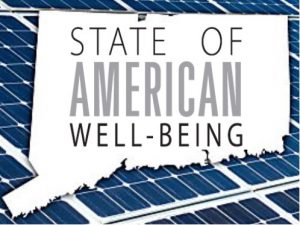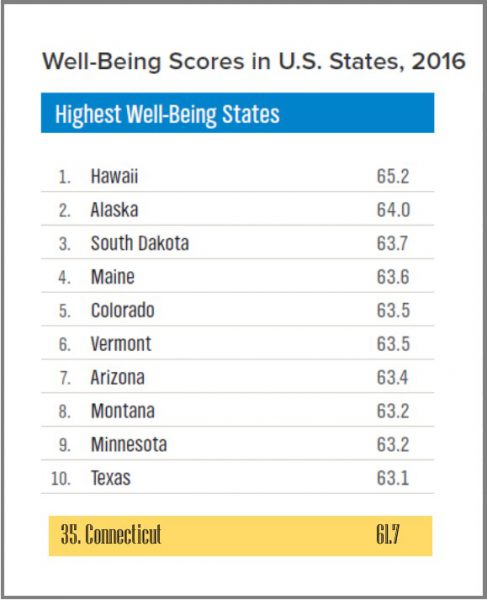CT Is 35th in Well-Being Among the States, Slipping Lower in Rankings
/Connecticut ranks 35th in well-being among the 50 states, according to a new Gallup-Healthways 2016 State Well-Being Rankings report. That’s a drop in the rankings for Connecticut, which averaged a 28th place finish over the past three years. In 2016, Connecticut had a Well-Being Index score of 61.7, which is lower than the national Well-Being Index score of 62.1. The report, which is part of the Gallup-Healthways State of American Well-Being series, examines well-being across the nation, including how well-being varies by state and which states lead and lag across the five elements of well-being. They are:
In 2016, Connecticut had a Well-Being Index score of 61.7, which is lower than the national Well-Being Index score of 62.1. The report, which is part of the Gallup-Healthways State of American Well-Being series, examines well-being across the nation, including how well-being varies by state and which states lead and lag across the five elements of well-being. They are:
- Purpose — Liking what you do each day and being motivated to achieve goals
- Social — Having supportive relationships and love in one’s life
- Financial — Managing one’s economic life to reduce stress and increase security
- Community — Liking where you live, feeling safe and having pride in your community
- Physical — Having good health and enough energy to get things done daily.
Hawaii ranked the highest in well-being, followed by Alaska, South Dakota, Maine, Colorado, Vermont, Arizona, Montana, Minnesota and Texas. Hawaii’s 65.2 was the highest score in the past three years. Hawaii led the nation in financial, community and physical well-being. Alaska and Texas led thenation in social and purpose well-being, respectively.
West Virignia ranked the lowest, and other states at the bottom of the list included Oklahoma, Kentucky, Indiana, Arkansas, Ohio and Alabama.
In a category-by-category review, Connecticut ranked 13th in physical, 19th in social, 37th in financial, 45th in purpose, and 48th in community.
“[Well-being] can be a force multiplier to the bottom line by directly influencing healthcare costs, resilience, and retention as well as to the top line through factors such customer satisfaction, sales and innovation,” said Michael Thompson, the President and CEO of National Alliance of Healthcare Purchaser Coalitions.
Well-being in the United States continues to exhibit regional patterns with the Northern Plains, Mountain West and some Atlantic states generally reporting higher levels, while states in the South and Midwest consistently lag in certain elements. The only New England state ranking lower than Connecticut was Rhode Island, at number 42. Rhode Island had the lowest social and community well-being categories. Massachusetts ranked 14th overall, improving from an average 20th place ranking in recent years.
Among the positive trends identified include historically low smoking rates (now at 18.0%, down from 21.1% in 2008); historically high exercise rates as measured by those who report they exercised for 30 minutes or more, three or more days in the last week; and the highest scores recorded on healthcare access measures, with the greatest number of Americans covered by health insurance and visiting the dentist. Americans are also reporting the lowest rates of healthcare insecurity since 2008, as measured by not being able to afford healthcare once in the last 12 months.
The report noted that married people have the lowest rates of depression (13.4%) and sadness (13.5%), and the highest rates of enjoyment (87.8%) and happiness (91.3%), compared to people from any other marital status. Adults with children living at home are more stretched emotionally, reporting more worry and stress on any given day, but also more happiness, smiling, and laughter.
In addition, the report noted that more Americans say they use their strengths on a daily basis, say their supervisor treats them like a partner, and creates a trusting and open environment than in any other year since 2008.






























